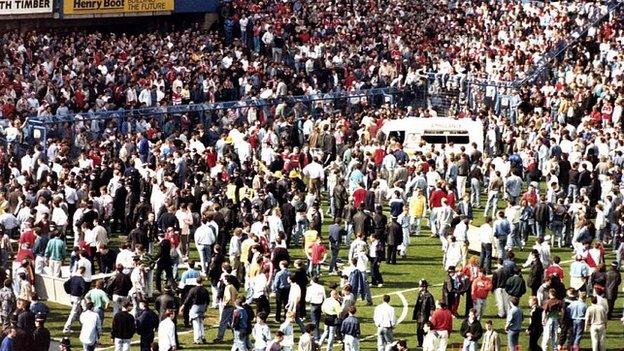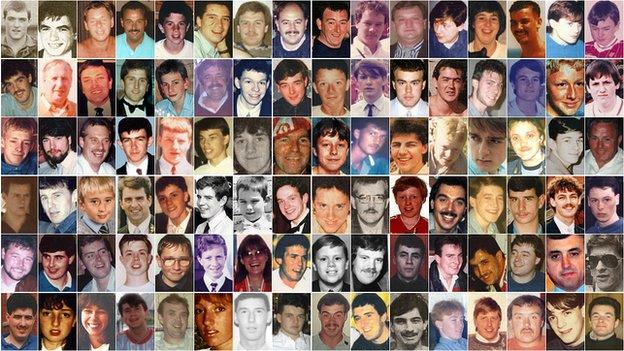Hillsborough inquests: Hospital transfers took 'awfully long time', doctor says
- Published

Dr Timney agreed the area he was working in was "crowded and perhaps chaotic"
Delays in taking casualties to hospital were a factor in the deaths of fans at Hillsborough, the inquests have heard.
Dr Brian Timney, who attended the 1989 FA Cup semi-final as a fan with two doctor friends, highlighted a "lack of immediate transfer to hospital".
The doctor, who volunteered and treated casualties, said it seemed to take an "awfully long time" to organise taking injured fans to hospital.
Ninety-six Liverpool fans died after a crush on the Leppings Lane terraces.
The coroner thanked Dr Timney, who had been standing with Nottingham Forest fans at the opposite Spion Kop end of the stadium in Sheffield, for the first aid he performed on fans.
Dr Timney and his friends offered their services to a police officer after seeing a fan being carried on a stretcher.
They began treating casualties outside the ground's first aid room under the North Stand at about 15:10 - four minutes after the match on 15 April 1989 had been stopped on police orders.
'Speed up'
Jenni Richards QC, who represents the Yorkshire Ambulance Service, told him that 39 ambulances arrived at the stadium during his time at the ground.
Dr Timney said: "There was obviously a gap - which is crucial for serious injuries - between them arriving and the system getting organised for transfer."
He said he did not know how long it took for ambulances to arrive and start taking patients away but "it seemed to take an awfully long time and my concern was to speed that process up".

Who were the 96 victims?

BBC News: Profiles of all those who died

Dr Timney said he started labelling those who needed to be taken to hospital urgently with a sticker, but it was "some time" before anybody was moved from the area.
He did not receive any instructions from "anyone, either police or otherwise", he said, and "took the lead" as there was "really no management".
"There was no outside organisation or direction," he said.
'Lack of control'
Ms Richards said the jury had heard from two ambulance officers who worked in the same area, one of whom mentioned handing out equipment in that area.
Dr Timney said he "saw no ambulance officers there", but agreed the area was "crowded and perhaps chaotic".
He also agreed that he attended the match in "ordinary civilian clothing" and would not have been identifiable as a medical professional.
The jury heard that Dr Timney answered a police questionnaire after the disaster, which asked: "Did you witness anything that you consider was a factor in the deaths or the injuries to any person?"
He answered: "Lack of immediate transfer to hospital and medical supplies."
A later question asked: "Do you have any views or observations on the way the incident was handled after the match was stopped?"
Dr Timney wrote: "Lack of control by persons in authority in organising and responding to the size of the tragedy."
He told the jury his "main focus" in answering that question was "on the police".
The inquests sitting in Warrington, Cheshire, are due to resume on Monday.